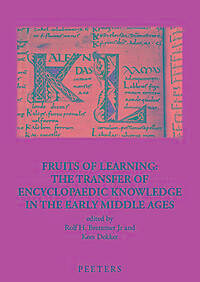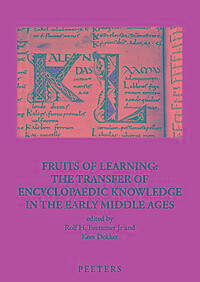
- Afhalen na 1 uur in een winkel met voorraad
- Gratis thuislevering in België vanaf € 30
- Ruim aanbod met 7 miljoen producten
- Afhalen na 1 uur in een winkel met voorraad
- Gratis thuislevering in België vanaf € 30
- Ruim aanbod met 7 miljoen producten
Zoeken
Fruits of Learning
The Transfer of Encyclopaedic Knowledge in the Early Middle Ages
€ 89,00
+ 178 punten
Omschrijving
Encyclopaedic knowledge--factual knowledge of the divine and human worlds--had profound effects on intellectual activities in the early Middle Ages and its aftermath. Authors and scribes were raised in an intellectual and didactic tradition in which the acquisition and development of encyclopaedic knowledge was highly valued. Their concern with the elementary aspects of time, language, world history, God's creation and the Bible informed their activities as compilers of manuscripts or as producers of texts. They reaped the fruits of the learning that had grown over the centuries, digested them, or discarded them, or caused them to re-emerge after a long period of time and be used for purposes quite different from those for which they had originally been cultivated. The varieties of such fruit are as diverse as encyclopaedic learning itself, involving musicology, epistolography, liturgy, the study of grammar, codicology, the establishment of reading programmes, the writing of history and, perhaps most prominently, the compilation and promulgation of glosses and glossaries--one of the most essential disciplines in early medieval learning. The present volume casts light on the way in which encyclopaedic knowledge came to fruition in the ever expanding and diversifying world of medieval learning. Resulting from the fourth workshop in the 'Storehouses of Wholesome Learning' project, it builds on the foundations laid by its predecessors. The contributors discuss the influence of encyclopaedic knowledge in their respective fields of expertise. Their generous responses have provided a rich palette of new insights into medieval intellectual culture. Their articles deepen our understanding of medieval learning in its ability to instrumentalise the knowledge inherited from the classical world in the creation of new cultures of wisdom.
Specificaties
Betrokkenen
- Uitgeverij:
Inhoud
- Aantal bladzijden:
- 420
- Taal:
- Engels
- Reeks:
- Reeksnummer:
- nr. 21
Eigenschappen
- Productcode (EAN):
- 9789042933378
- Verschijningsdatum:
- 6/10/2016
- Uitvoering:
- Paperback
- Formaat:
- Trade paperback (VS)
- Afmetingen:
- 170 mm x 239 mm
- Gewicht:
- 1020 g

Alleen bij Standaard Boekhandel
+ 178 punten op je klantenkaart van Standaard Boekhandel
Beoordelingen
We publiceren alleen reviews die voldoen aan de voorwaarden voor reviews. Bekijk onze voorwaarden voor reviews.










